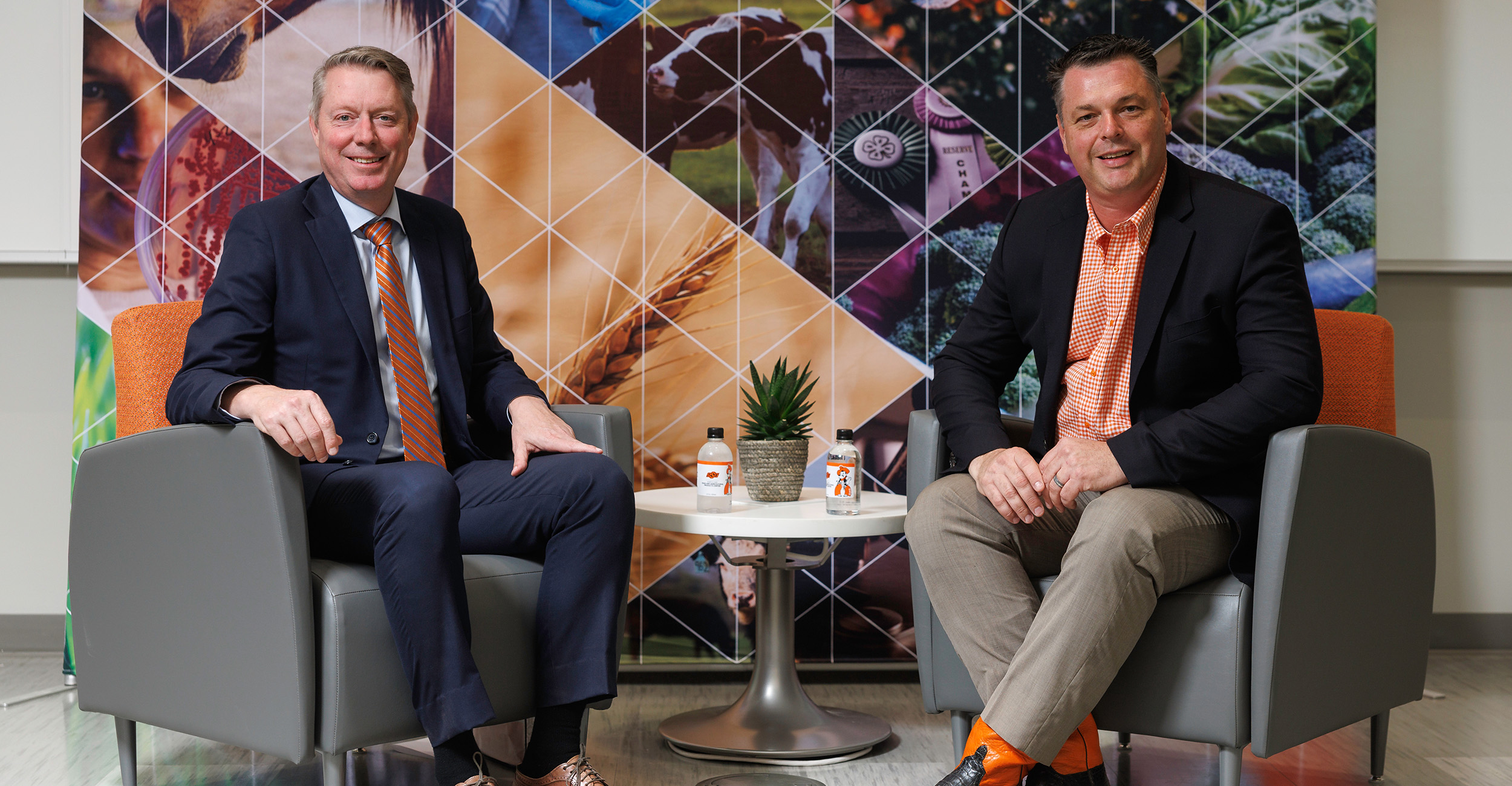
OSU Dean’s Dialogue discusses land stewardship and data-driven innovation
Wednesday, September 18, 2024
Media Contact: Mandy Gross | Sr. Manager of Strategic and VP Communications | 405-744-4063 | mandy.gross@okstate.edu
The Oklahoma State University Agriculture Dean’s Dialogue series continues its commitment to discussing current agricultural topics with leadership perspectives from the world-renowned King Ranch.
Jayson Lusk, vice president and dean of OSU Agriculture, sat down with Robert Hodgen, president and chief executive officer of King Ranch Inc. and OSU animal science alumnus, on Sept. 9 during OSU Land-Grant Week. The duo discussed the future of the agricultural industry through land stewardship and data-driven solutions.
King Ranch is a family-owned and privately held agribusiness, real estate, energy and natural resource management company with diversified operations in Texas, Florida and California. Since 1853, King Ranch has prioritized habitat conservation and land stewardship as a core tenet of the family legacy. The ranch began with cattle and has expanded into various forms of crop farming, turfgrass production, machinery dealerships, luxury retail goods and recreational hunting.
“The thing that sets King Ranch apart is that we have an authentic passion for habitat conservation,” Hodgen said. “If maximizing cattle production was our primary goal, we could probably run twice as many head, but the long-term goal is conservation of our natural resources and has been for well over 100 years.”
To help preserve the land, King Ranch has implemented several management practices that keep the ranch, located in south Texas, healthy and thriving. Many of their efforts focus on managing invasive brush species and promoting the production of forbs and native grass species while actively managing the grazing load from cattle and wildlife. This is all done in an area with highly variable rainfall that was once called the Wild Horse Desert.
As the agricultural industry continues to advance and change, Hodgen believes the use of data and the adoption of technology will play a crucial role.
“We have so much data now that we can utilize the DNA from a day-old calf to help predict how fast it will gain and the quality of steaks it will produce 18 months in the future,” Hodgen said.
The important factor in collecting data is figuring out what to do with it, he said. When actionable data is collected, it can be used to help guide decisions.
While data analysis has proven to be a successful tool for King Ranch, Hodgen acknowledged that mistakes are bound to happen.
“We have to learn to fail well,” Hodgen said. “We are all going to make mistakes, but we need to learn from them.”
Hodgen said the company’s core value focuses on a “willingness to learn” and how it can promote curiosity among King Ranch employees. The team evaluates what they can learn from various situations, and Hodgen emphasized the importance of lifelong learning.
This advice resonated with Cooper Crow, an agribusiness freshman in the Ferguson College of Agriculture from Friendswood, Texas. Crow said he was grateful for the opportunity to hear the knowledge and wisdom Hodgen imparted as Crow navigates college.
“Seeing people like Mr. Hodgen excited about what the future holds for the agricultural industry makes me excited to see what I can do and how I can help those after me,” Crow said.
OSU Agriculture launched the Dean’s Dialogue series in the fall of 2023 to focus on important conversations in the agricultural industry.
“The Dean’s Dialogue is designed to engage the university with real-world challenges we aim to solve,” Lusk said. “King Ranch is deeply involved in a diverse mix of agricultural enterprises, and learning from Robert about how they steward the land, adapt to change and technology, and serve their customers helps ensure that we are preparing students for their future and designing our research and Extension programs to have their highest impacts.”
For a recap of the Sept. 9 event, please view the Dean’s Dialogue highlight video.
Story By: Ainsley Treesh | ainsley.treesh@okstate.edu
